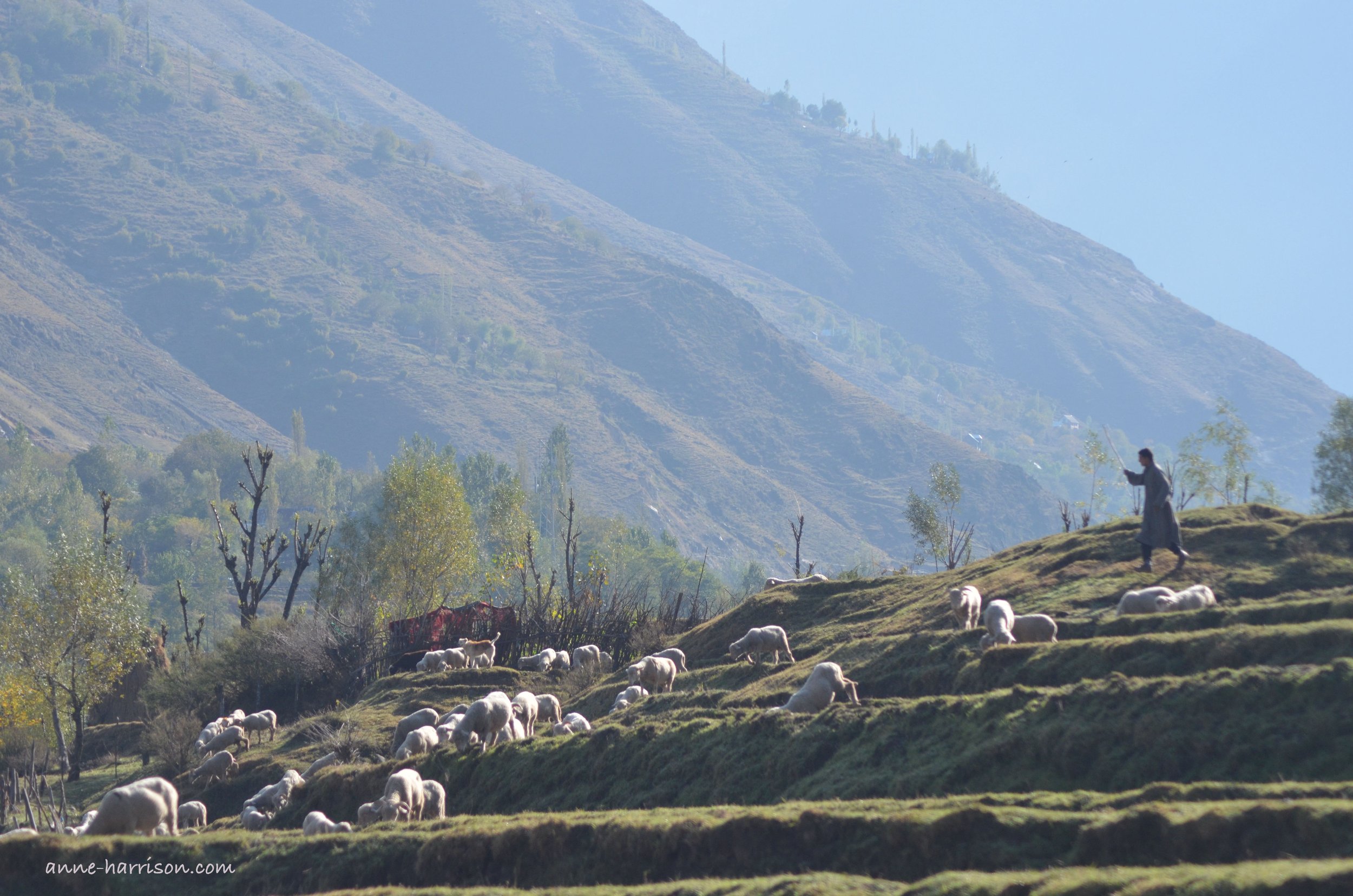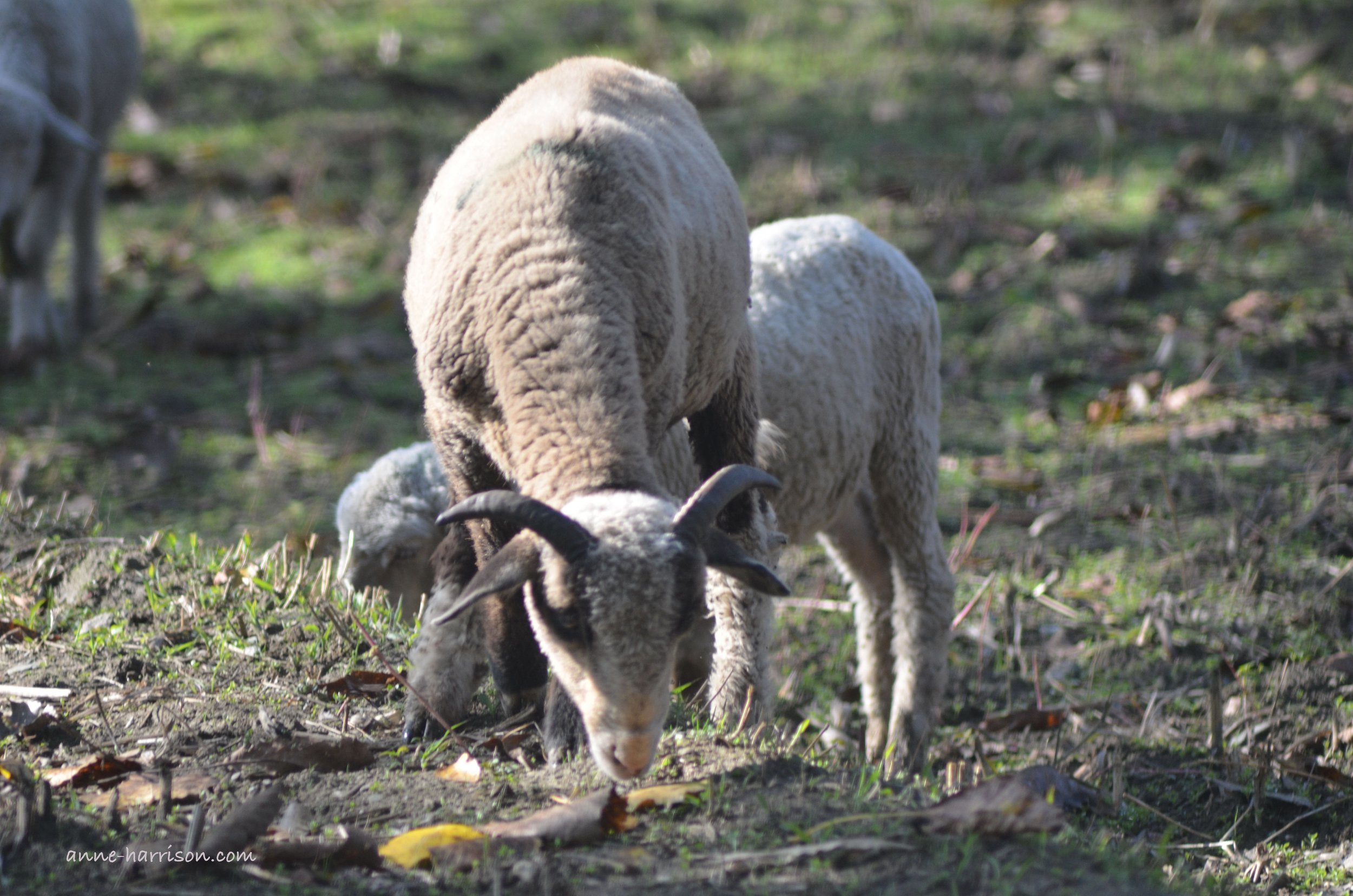Somewhere in Kashmir
The shepherd’s hut © A. Harrison
If I had known, on waking up, that somewhere around lunchtime I’d be using a squat toilet in a shepherd’s hut I may not have left my bed – and so would’ve missed out on a surreal experience.
It was still dark when the call to prayer drifted across the water. Every morning this chant has proven as effective as any alarm clock. The melody blended with the gentle lapping of the water against our house boat is a peaceful way to start the day.
Soon we’d breakfasted and piled into our shikari – colourful wooden boats were I snuggled under some rugs as I reclined among the cushions. It had rained overnight, and the snow had crept further down the mountains. Our shikari-wala – the man paddling our boat with a heart-shaped paddle – broke into song, words which seemed to meld with the colours of sunrise as they touch the waters of Dal Lake.
Few shops were open as we drove though Srinagar. Under Indian occupation, the Kashmir shops now are under curfew. Many have been shut for months, with no reprieve in sight. For those living here, there are no phones, no internet, and so no knowledge of what is happening in the outside world. Universities and schools are shut down, and earning a living seems to becoming more and ore impossible. Soldiers are everywhere, and few women are to be seen. I’d wanted to explore the old town, a medieval tangle of alleyways and old brick buildings, but with nothing open it was not a safe place for an obvious non-local to be.
Our biggest fan with one of his lambs © A. Harrison
Amidst rumours of protests and stone throwing against anyone breaking the curfew, our guide was taking us out of town early in the morning, rather than after a leisurely lunch as planned, fearing eight Western women in a convoy of cars might prove too tempting a target. Our destination was Ley in Ladahk, two days and quite a few mountain passes away. Tonight we were aiming for Kargil.
A six hour drive to Kargil lay ahead of us. The town may be only 200km away, but this involved crossing the Zojila Pass at 11,500 feet. We hadn’t got far from town, however, when some shepherds and goat herders stopped us. Their flocks skittered along the road, a few dogs keeping them in order as they made way into town for tomorrow’s market. The shepherds waved to us as the passed.
Kashmir lies in a valley between two mountain ranges, and the land is incredibly fertile. In the lower lands crops were being harvest for the winter, and we passed rolls of hay left to dry in the fields, as if driving through a Dutch painting.
Soon out of Srinagar we came to mountains. Real, snow-covered mountains, such as we don’t have in Australia. At first they stood covered in pine trees (there is actually a ski-field near here) but soon the land grew barren as we came into the dry side of the Himalayas, where it can go for years without rain.
The land here has its own beauty. Rocks jut into the air as the continual grind of the continental shelves gives amazing shapes to the mountains. The houses here seem to grow out of the very earth. The same colour as the land, they are squat with flat roofs for drying both poplar branches and cow dung. Both are used for fires over winter, when everyone is snowed in. (Apparently the cow dung gives food a nutty taste). Every now and then a cluster of poplars grew in the distance or stretched along the river, their colours golden in this clear light.
Lambs everywhere © A. Harrison
We passed so many soldiers along the way. The town of Srinagar had been filled with them; now our cars passed small cities of army camps, complete with their own shops, hospitals schools and the like. Unlike the houses, which can difficult to see from a distance, these were covered in jungle camouflage, easily visible against the dry earth. For our entire drive the road was filled with posters and signs commemorating the Army. At Dras is the War Memorial commemorating the capture of Tiger Hill and Pimple Hill from the Pakistanis in 1999, a way fought over barren land at altitude and in the snow.
In one dusty town I bought chips, nuts and apricots form a local store, for under $2. (My excuse for bolstering the local economy. As was the chocolate.) At another we stopped for a delicious lunch of chicken and rice. None of us got sick along the way.
The cars pulled over in the middle of nowhere to give us a chance to stretch our legs. Taking a stroll along a country lane made mainly of pebbles, we suddenly found ourselves surrounded by sheep and cows as the path became a rocky wall between paddocks. Shepherds madly blew their whistles as cows and sheep jumped the low walls with abandon. Dogs and small boys ran after the sheep who’d jump back over the fence as soon as no one was looking. It was a game which must last all day, everyday.
Grandpa, daughter-in-law and grandson © A. Harrison
Cutting through a paddock of sheep to try and find a way back to the road, we met the shepherd who offered us tea, and gave us fresh walnuts from his tree to munch on. One of his many young sons took great delight in bringing us a lamb each to cuddle. As we chatted in sign language the whole family arrived, including a proud grandpa with his henna beard, grandma, the shepherd’s wife, brothers, sisters, sons, daughters. The children were absolutely gorgeous. Like all children, the world should be theirs, wherever they were born.
Then there was the squat toilet in the outhouse – clean and a welcome find now I had perfected the art of using them!
Such beautiful children © A. Harrison
Like my photos? - if you feel like contributing to my coffers, please click either here or on the link in my header to buy (or simply browse) my photos. Or else, please click here to buy either my poetry or novel ebooks. I even have a YouTube channel. Thank you!







